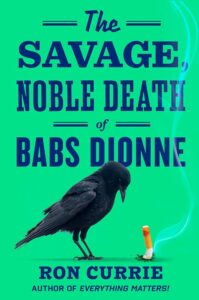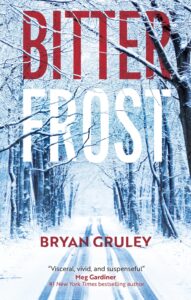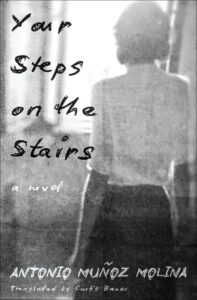There is a particular type of novel that is simultaneously about everything and nothing. You’ve read at least a couple of them. They’re novels that meander, that revel in minutiae, that shine a very big, very intense spotlight on common things, on small details, on relatively meaningless conversations. Writing a novel like this is relatively easy. Writing a novel like this that works is a different story. Luckily, Antonio Muñoz Molina is a superb storyteller, and Your Steps on the Stairs (Other Press), his latest novel to be tra
nslated into English–beautifully, it must be said, by Curtis Bauer–is a master class in how to make a very big, engrossing something out of almost nothing.
A man is leaving his home in New York to remake his life in Lisbon. His wife is an important researcher working on fear and memory and is currently overseeing an important research project in New York, so the man travels alone to their new home and focuses on getting everything ready for his wife’s arrival. While he waits, the man reminisces about their life in NYC and what 9/11 was like for those who were close to Ground Zero. He reads and thinks about the books he reads. He writes–like a journal–and his narrative shifts focus constantly, narrating the present and the past, jumping between the two from time to time while also focusing on a growing list of things like the nature of fear, the city of Lisbon, and his dog. The man is alone, but alone with his past and his memories and his waiting. In that state, his only option is to listen to the stories he has to tell himself, and that can be a dangerous thing.
One of the many things I love about crime fiction is that we have created names for a lot of things and those names help us easily understand complicated things. For example, psychological suspense perfectly describes Your Steps on the Stairs, but it also falls shorts–like it does every time we use it–because no book ever contains just psychological suspense and because psychological suspense can be an endless number of things. So yes, this is psychological suspense, but also a story about love and longing, about friendship and loneliness, about what fear is and what it does to us, about how we are actively bringing about the end of the world through climate change. Yes, a mess, but a beautifully crafted and very engaging one.
The hardest thing about reviewing is finding balance. You already know I love this novel. I want you to read it. That said, it has a big flaw. In the last third, instead of ramping up, it slows down. A visit to a palace that stretches for pages and a meeting with a woman who looks likes Cecilia and the ensuing conversation that occupies just as much space are both a tad tedious and smell faintly of an excessively gracious–or very scared–editor. That said, the stumble at the end doesn’t take away from the power of this work. In fact, I think it’s a good reminder that even the most talented ballerina has fucked up toes.
Your Steps on the Stairs is a gripping novel about waiting, and that’s a rare thing. Waiting is rarely pleasant, but our narrator fills the void with things he loves; reading, learning, walking the dog, running, thinking, doing nothing, eating, remembering, drinking good coffee. In less capable hands, this story would’ve been a dull, disjointed, pointless mess. In the hands of Muñoz Molina, the result is an absorbing, unpredictable narrative that obeys only itself and the whims of the narrator’s memories, passions, desires, thoughts, and temporary fixations. Muñoz Molina is a master, and he’s firing on all cylinders here. Weird and wonderful.
*
“Hey, new Ron Currie novel is out!” should be enough to get readers excited, so I’ll try to keep this short. The Savage, Noble Death of Babs Dionne (G.P. Putnam’s Sons) is great. Tense. Funny. Violent. Touching. Peppered with French. Full of heart.

Babs Dionne is the kind of loving grandma that also happens to be a powerful, ruthless crime matriarch who’s not afraid to get blood on her hands. She is also a very proud Franco-American from the small town of Waterville, Maine who loves speaking French, keeping her culture alive, and giving back to the community. Babs, with the help of a group of women–family and lifelong friends–that help her, controls the streets of Waterville. Literally. From who gets killed to what drugs can come in, if it happens in Little Canada, Babs approved it, did it, knows about it, or is about to find out. But things are getting tougher than ever. Lori, Babs’s oldest daughter, is an addict going through a rough time and Sis, the youngest of the Dionne women, goes missing for a while before they find her body. By the time a sinister man known only as The Man comes to Waterville to check why numbers are down and to offer Babs a solution, the matriarch is out of patience, and when Babs loses her patience, bad things happen.
I could write down a bunch of great quotes from the book here while talking at length about how Currie blends crime, literary fiction, humor, and something else, something entirely his, to great effect. But I won’t do that. I won’t bore you. Currie is great and this is his best so far. Seriously. He even pulls off a 25-page “prélude” that more or less contextualizes not only Babs for also the whole narrative. From bloody beatings to righteous anger to a deep, honest look at vengeance and justice to funny dialogue to a very humane look at loss and grief, Currie has something for everyone here. Go read it.
**
I have absolutely no interest in reading a crime novel full of hockey. I was born and raised in a small Caribbean island where there’s beach weather all year long. What’s that? Bryan Gruley wrote it? Ah, that’s a different story. Gimme that.

Bitterfrost, Michigan has the kind of winters you’re imagining based on name and location. In places like that, especially in small towns, hockey can be a religion, and Jimmy Baker, who now drives a Zamboni for the town’s amateur team, had a taste of that for many years and even became a bit of local hero before quitting the game after a very violent fight on the ice. One morning, Jimmy wakes up on his kitchen floor with a shiner on his face and no recollection of how he got there. Soon after, Jimmy is arrested for double murder. The two men who were killed were from out of town and were making a fuss at the local bar. Jimmy–big, violent Jimmy who used to be a bruiser for his hockey team–was there. As the evidence against Jimmy accumulates, local attorney Devyn Payne and detective Garth Klimmek, who is working the murder case, must answer a lot of questions about that night, but Jimmy really can’t remember a thing and no one wants to talk.
The thing about Gruley is that he knows how to build a narrative. He sets the stage, introduces the characters, pulls you into the culture of Bitterfrost, and makes sure you understand the impact of serious winter weather. Then the twists start and the tension goes up with every new chapter, with every new revelation, new piece of evidence, new bloodstain. Part procedural, part meditation on small town life, part violent crime story, Bitterfrost (Severn House) is the kind of crime novel where you can immediately identify the elements but can clearly see they’ve been mixed in a fresh way by a talented storyteller.
While Jimmy is an interesting character with a good heart and a very bloody past, it’s Devyn and Klimmek who truly carry the story. Devyn has a few powerful enemies and a very recent client she cared about ran from town before her court date and was found dead a few days later. Klimmek has some odd evidence, two bodies, a lot of questions, and must constantly deal with the aftermath of a bad case that still haunts me. The chapters switch focus between all the main characters, but the narrative remains clean, cohesive, and easy follow.
Bryan Gruley writes amazing crime fiction, and this new novel–chilling, full of characters that feel real, with a ton of heart–is his best work yet.


















